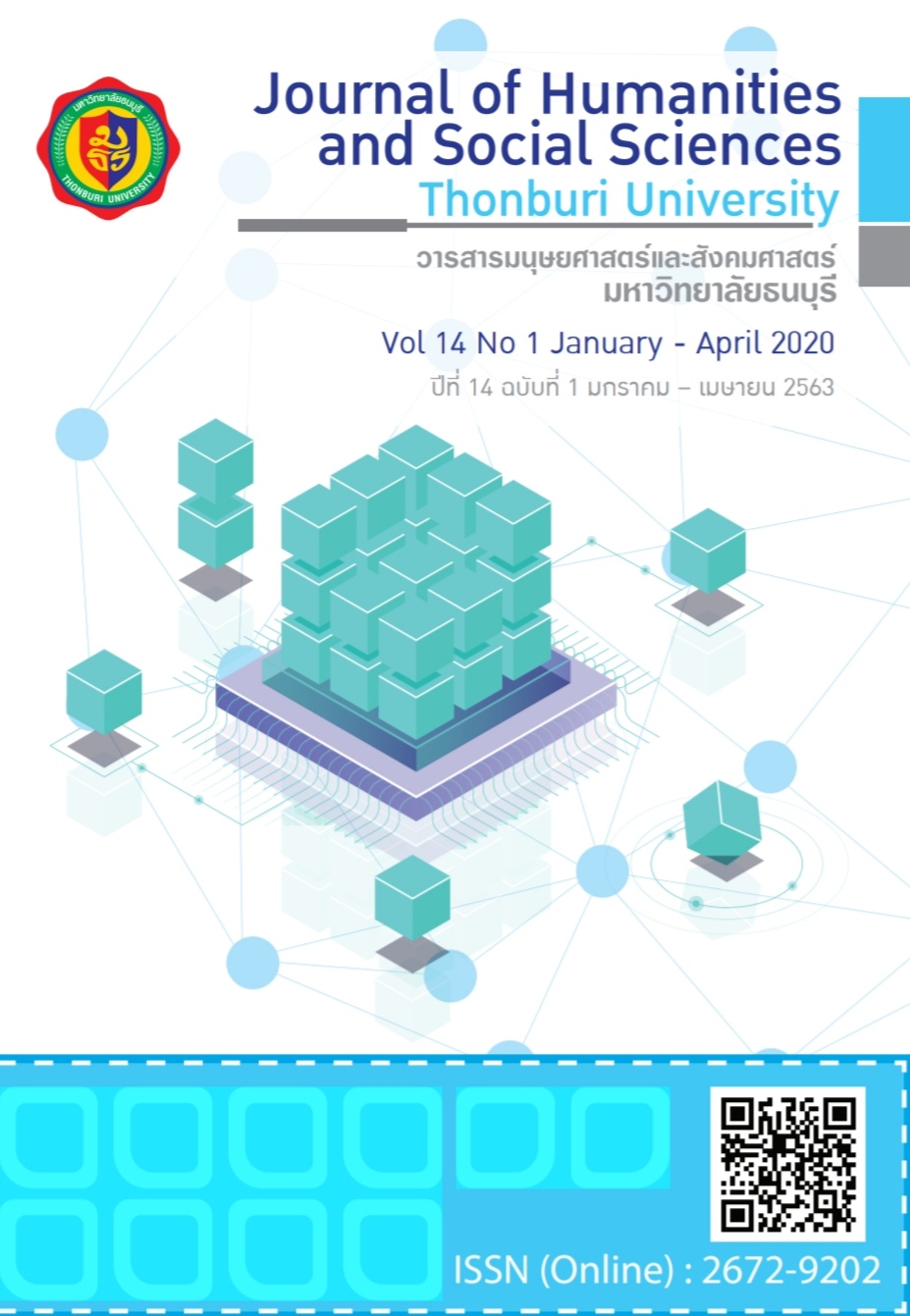รูปแบบการคิดของนักศึกษา คณะครุศาสตร์อุตสาหกรรม มหาวิทยาลัยเทคโนโลยีพระจอมเกล้าพระนครเหนือ
คำสำคัญ:
รูปแบบการคิด, นักศึกษา, คณะครุศาสตร์อุตสาหกรรมบทคัดย่อ
การวิจัยครั้งนี้มีวัตถุประสงค์เพื่อศึกษาและเปรียบเทียบรูปแบบการคิดของนักศึกษาคณะครุศาสตร์อุตสาหกรรม มหาวิทยาลัยเทคโนโลยีพระจอมเกล้าพระนครเหนือ จำแนกตามภาควิชา กลุ่มตัวอย่างประกอบด้วย ภาควิชาครุศาสตร์เครื่องกล 73 คน ภาควิชาครุศาสตร์ไฟฟ้า 99 คน ภาควิชาครุศาสตร์โยธา 65 คน และภาควิชา คอมพิวเตอร์ศึกษา 65 คน รวมทั้งสิ้น 302 คน โดยใช้วิธีสุ่มแบบแบ่งชั้น เก็บรวบรวมข้อมูลด้วยแบบสอบถามแบบมาตราส่วนประมาณค่า 7 ระดับโดยแบบสอบถามมีค่าความเชื่อมั่นเท่ากับ 0.983 และวิเคราะห์ข้อมูลโดยใช้ค่าเฉลี่ย ส่วนเบี่ยงเบนมาตรฐาน และการวิเคราะห์ความแปรปรวนพหุคูณ (One-Way MANOVA) ผลการวิจัยพบว่า รูปแบบการคิดที่มีค่าเฉลี่ยสูงสุดเรียงลำดับจากมากไปหาน้อยดังนี้ รูปแบบคิดเรียงลำดับ รองลงมาคือรูปแบบชอบสร้างกฎเกณฑ์ รูปแบบเก่งบริหารจัดการ รูปแบบจัดสรรขาดระเบียบ รูปแบบเสรีนิยม รูปแบบชำนาญวินิจฉัย รูปแบบคิดแบบร่วมมือ รูปแบบมองเฉพาะเจาะจง รูปแบบมอง รูปแบบมุ่งในสิ่งเดียว รูปแบบทำหลายอย่างพร้อมกัน รูปแบบยึดถือตนเอง และรูปแบบการคิดที่มีค่าเฉลี่ยน้อยที่สุดคือ รูปแบบอนุรักษ์นิยม และเมื่อเปรียบเทียบระหว่างภาควิชาที่ต่างกัน พบว่ารูปแบบ การคิดทั้ง 13 รูปแบบ มีความแตกต่างระหว่างภาควิชาอย่างมีนัยสำคัญทางสถิติ ดังนั้นเมื่อตรวจสอบค่าเฉลี่ยรายคู่ พบว่า มีจำนวน 7 รูปแบบ ซึ่งมีความแตกต่างกันระหว่างภาควิชาที่ต่างกันอย่างมีนัยสำคัญทางสถิติ ประกอบด้วย รูปแบบชอบสร้างกฎเกณฑ์ รูปแบบเก่งบริหารจัดการ รูปแบบชำนาญวินิจฉัย รูปแบบคิดเรียงลำดับ รูปแบบยึดถือตนเอง รูปแบบเสรีนิยม และรูปแบบอนุรักษ์นิยม โดยมีค่าเฉลี่ยของนักศึกษาภาควิชาคอมพิวเตอร์ศึกษาสูงกว่าภาควิชาครุศาสตร์เครื่องกล ภาควิชาครุศาสตร์ไฟฟ้า และภาควิชาครุศาสตร์โยธา(ตามลำดับ) อย่างมีนัยสำคัญทางสถิติที่ระดับ 0.05
เอกสารอ้างอิง
ณรงค์ศักดิ์ ธรรมโชติ, อนิวรรต หาสุข และกนกอร นุ้ยเล็ก. (2553). การพัฒนาทักษะการคิดและการแก้ปัญหาโดยการสอนแบบโครงงานที่เน้นกระบวนการกลุ่มสัมพันธ์ ในการตรวจสอบโครงสร้างจุลภาคโลหะวิชา Physical Metallurgy Laboratory I ในระดับชั้น ป. ตรี 2/4 ภาคเรียน 1 ปีการศึกษา 2553. คณะวิศวกรรมศาสตร์และสถาปัตยกรรมศาสตร์, มหาวิทยาลัยเทคโนโลยีราชมงคลอีสาน
น้ำเพชร ช่วงทอง. (2548). การวิเคราะห์รูปแบบการคิดของเยาวชนไทย. วิทยานิพนธ์ครุศาสตรมหาบัณฑิต สาขาวิชาวิจัยการศึกษา. คณะครุศาสตร์, จุฬาลงกรณ์มหาวิทยาลัย.
ประกายทิพย์ พิชัย; ภูริทัต สิงหเสม; ทรงเกียรติ อิงคามระธร; และ จุฑารัตน์ รุ่งจารัส. (2560). ความสัมพันธ์ระหว่างบุคลิกภาพกับความรู้สึกอ่อนไหวต่อการแพร่ระบาดทางอารมณ์ของนักศึกษาระดับปริญญาตรี ในเขตกรุงเทพมหานคร. วารสารวิชาการมหาวิทยาลัยธนบุรี. 11(24): 43-55.
พรรณี ลีกิจวัฒนะ. (2553). วิธีการวิจัยทางการศึกษา. กรุงเทพฯ: คณะครุศาสตร์อุตสาหกรรม สถาบันเทคโนโลยีพระจอมเกล้าเจ้าคุณทหารลาดกระบัง.
มหาวิทยาลัยเทคโนโลยีพระจอมเกล้าพระนครเหนือ. (2561). ปรัชญา. สืบค้นเมื่อ 18, มีนาคม 2561, จาก http://www.fte. kmutnb.ac.th/history.php.
เมธา อึ่งทอง, ผดุงชัย ภู่พัฒน์ และชิตพล มังคลากุล. (2561). การพัฒนารูปแบบการจัดการเรียนการสอนแบบห้องเรียนกลับด้าน เพื่อส่งเสริมผลสัมฤทธิ์ทางการเรียนวิชาหลักวิชาชีพครู. วารสารวิชาการมหาวิทยาลัยธนบุรี. 12(พิเศษ): 82-92.
ลิศรารัตน์ หอมหวล. (2557). รูปแบบการคิดของนักศึกษาคณะครุศาสตร์อุตสาหกรรม สถาบันเทคโนโลยีพระจอมเกล้าเจ้าคุณทหารลาดกระบัง. วิทยานิพนธ์ครุศาสตร์อุตสาหกรรมมหาบัณฑิต สาขาวิชาหลักสูตรและการสอนอาชีวศึกษา คณะครุศาสตร์อุตสาหกรรม สถาบันเทคโนโลยีพระจอมเกล้าเจ้าคุณทหารลาดกระบัง
ศักดิ์ศรี สืบสิงห์. (2561). การพัฒนาความสามารถในการคิดวิเคราะห์ของนักศึกษาสาขาวิชาวิทยาศาสตร์ทั่วไป คณะครุศาสตร์ มหาวิทยาลัยราชภัฏร้อยเอ็ด. วารสารวิชาการมหาวิทยาลัยธนบุรี. 12(27): 37-44.
สำนักงานปลัดกระทรวงศึกษาธิการกระทรวงศึกษาธิการ (2560). แผนพัฒนาการศึกษาของกระทรวงศึกษาธิการ ฉบับที่ 12 (พ.ศ.2560 -2564). สืบค้นเมื่อ 17 เมษายน 2560, จาก https://www.dropbox.com/ s/oyoof2.
อดุลย์ วังศรีคูณ. (2557). การศึกษาไทยในศตวรรษที่ 21 : ผลผลิตและแนวทางการพัฒนา. วารสารมนุษยศาสตร์และสังคมศาสตร์ บัณฑิตวิทยาลัย มหาวิทยาลัยราชภัฏพิบูลสงคราม. 8(1): 1-17.
Sternberg; & Wagner. (1991). Thinking Styles Inventory. Retrieved May 9, 2016, from https://www.researchgate.net/publication/ 305114302_Thinking_Styles_Inventory
Translated Thai References
Chongtong Nampet. (2005). Analysis of Thinking Patterns of Thai Youth. Master of Education. Faculty of Education. Chulalongkorn University. (in Thai)
Homhoun, L. (2014). Thinking Styles of Students in The Faculty of Industrial Education at King Mongkut’s Institute of Technology Ladkrabang. Master of Industrial Education. Vocational Curriculum and Instruction. King Mongkut’s Institute of Technology Ladkrabang. (in Thai)
King Mongkut’s University of Technology North Bangkok. (2018). Philosophy. Retrieved March 18, 2018, from http://www.fte. kmutnb.ac.th/history.php. (in Thai)
Lasootta, K. (2010). Development Higher-Order Thinking Skills of Mathayom Sueksa 11 Students through Use of the Systems Thinking Instrustion Model (STIM). Master of Education. Faculty of Education. Rajabhat Mahasarakham University. (in Thai)
Leekitchwatana, P. (2010). Educational research. Bangkok. Faculty of Industrial Education. King Mongkut’s Institute of Technology Ladkrabang. (in Thai)
Office of The Permanent Secretary Ministry of Education. (2017). Education Development Plan, Ministry of Education No. 12 (2017-2021). Retrieved April 20, 2017, from https://www.dropbox.com/ s/oyoof2
(in Thai)
Oungthong, M.; Pupat, P.; & Mangkhalakun, C. (2018). A Development of Flipped Classroom Instruction Model to Enhance Learning Achievement in the Principles of Teaching Profession Course. Journal of Thonburi University. 12(Special Issue): 82-92. (in Thai)
Pichai, P.; Singhasem, P.; Inghamarathon, S.;& Rungchamrus, J. (2017). The Relationship between Personality and Susceptibility to Emotional Contagion of Undergraduate Students in Bangkok. Journal of Thonburi University. 11(24): 43-55. (in Thai)
Suebsing S. (2018). The Development Analytical Thinking of Students General Science Faculty of Education Roi Et Rajabhat University. Journal of Thonburi University. 12(27): 37-44. (in Thai)
Thammachot, N., Hasuk, A.; & Nooylek, K. (2010). The development of thinking and problem solving skillby using the problem base teaching which is used the grouping relation process in microstructure inspection on Physical Metallurgy Laboratory I subject, Metallurgical student class 2/4, Academic year 2553. Faculty of Engineering and Architecture. Rajamangala University of Technology Isan. (in Thai)
Wangsrikoon, A. (2014). Thai Education in the 21st Century: Productivity and Development. Humanities and Social Sciences Journal of Graduate School, Pibulsongkram Rajabhat University Current. 8(1): 1-17.
(in Thai)







